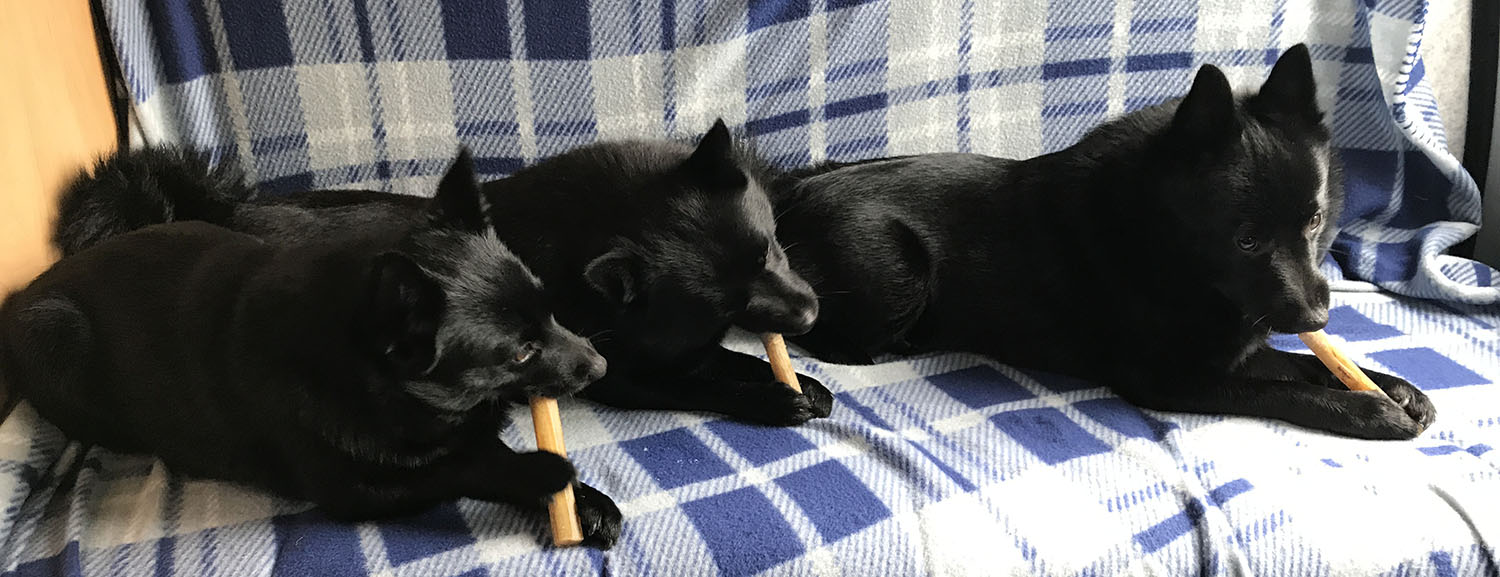The Schipperke Club’s Breed Health co-ordinator in Karen Brooks.
She is the person to contact with any DNA test results, please note the club is now offering a range of tests including MPSIIIB, von Willebrand’s disease and Natural Bobtail testing. To reflect this the club register will be including vWD and NBT results.
Please send your results to Karen by emailing petkargsd@yahoo.co.uk
The breed is still strong, robust and healthy. Many dogs live a very long and active life with some living in to their teens. This doesn’t mean that some dogs will not succumb to ailments due to old age. Just like us humans they can slow down, develop arthritis, lose teeth or develop cataracts.
Although there a few diseases the breed can suffer from, you will see these on this website, on the whole there have not been seen in the UK any dogs suffering from them although we do have carriers which we are striving to breed out by testing breeding dogs before any mating.
Our request for the Bobtail gene test to be recognised by the Kennel Club UK has been accepted. Test results will now be added to the Health Test Finder and the BRS (Breed Record Supplement) and in a register on this website. The Bobtail status is already recorded on pedigrees. We are over the moon with this. More information on the Bobtail gene can be found on the website.
We also requested that Von Willebrand Disease Type1 test be also recognised by the Kennel Club UK but at this time, without any published evidence of it affecting the breed, the KC declined to recognise the test. We will keep trying to get recognition.
As a club we are very proud to say that as a breed we have very healthy dogs and are striving to keep it that way.
Karen Brooks
(Breed Health Co-Ordinator)
19th February 2023
BY IAN MILLAR
Given the ‘natural’ conformation of the Schipperke breed, there are no problems arising from its basic structure and most live active, healthy lives into their teens. Three conditions are sometimes found in the breed, but it must be stressed that none is common: mucopolysaccharidosis (MPS IIIB), epilepsy and Legg-Calve Perthes disease.
MPS IIIB is a degenerative neurological condition that is lethal and results in an affected dog being euthanised before its fourth birthday. Symptoms emerge between two and four years of age and include muscle weakness, tremor and loss of coordination. There is no effective treatment. The illness is hereditary, but fortunately, transmission is due to a mutated recessive gene and there are tests available at several laboratories now. The Schipperke Club maintains test result registers on its website, and while there have been some carriers in the last 15 years or so, there have been no affected animals in the UK to our knowledge. It is safe to say that breeders now seem to have this issue under control.
Epilepsy occurs occasionally in the breed, in most cases in a relatively mild form. The club participated in a longitudinal study being conducted by the University of Helsinki, which has yet to produce final reports. Dogs with mild epilepsy can often be treated with medication and can live good quality lives. Since any hereditary component of this condition is not clear, epileptic animals should not be used in breeding.
Legg-Calve-Perthes disease is primarily seen in smaller breeds of dog and is a degenerative disease of the hip ball-and-socket joint, resulting from disrupted blood flow to the bone, leading to cell and tissue necrosis. There is associated pain and lameness, and if untreated, there can be significant inflammation and arthritis. Surgery is effective and the prognosis is good if rehabilitative therapy is followed. There may well be a hereditary element to this disease and affected animals should not be bred. It is relatively rare in Schipperkes.
In recent years, another condition has become apparent – von Willebrand’s disease, a bleeding disorder where normal clotting does not occur. There have been some affected dogs – in most cases, fortunately, asymptomatic – but this is a serious, life-threatening condition and breeders are strenuously encouraged to test for it. Again, a recessive gene appears to be responsible and nowing a dog’s von Willebrand’s status is imperative if breeding is being contemplated.
In a minority breed such as Schipperkes, the gene pool is obviously restricted and close breeding from animals with common ancestry can easily give rise to new problems. At any given point, the breeding population is inevitably small, and discarding carriers, while it might be the instinctive reaction, can compound matters significantly. With reliable testing facilities available, the judicious use of carriers on clear-tested mates is a matter breeders need to explore thoroughly to help preserve genetic diversity. Breeders should remain mindful of the complete health of potential mates, as well as temperament and avoiding high inbreeding levels, to continue to keep this a healthy and robust breed.
Click here to view original article as a pdf
This article first appeared in the Kennel Gazette June 2022.
Copyright The Kennel Club Ltd.
Reproduced with their permission.
